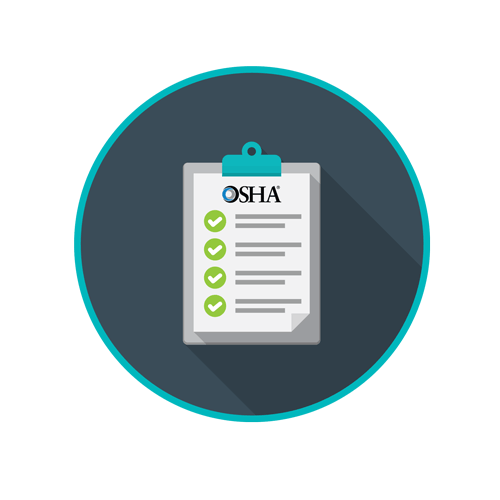Preparing for OSHA Onsite Inspections

Expect the Unexpected: Tips to prepare for an unscheduled on-site OSHA medical waste inspection
It’s Monday morning at your healthcare facility, you’re tired, and Jerry forgot to start the coffee pot (again). To add to this magical morning, your director just announced that OSHA will be conducting an unscheduled on-site Medical Waste Inspection — today. The news quickly circulates, everyone becomes bouncing balls of anxiety. The entire workforce is quickly consumed wanting to know the unknown: What will they inspect?
Removing the big bad wolf mask that is an OSHA inspection…
The Occupational Safety and Health Administration is here to help you. Their sole existence is to enforce workplace safety and healthcare compliance. Think of working conditions in the 1930s—no one wants to go back there!! Healthcare must be a proponent of health in all its aspects, which is why OSHA is actively engaged in how healthcare staff are trained, and things like sharps disposal or medical waste management comes under their jurisdiction and management. In addition to OSHA state plans, federal guidelines have specific requirements regarding the standards, safety, and enforcement of sharps and medical waste disposal.
What to Expect during the Inspection
It’s vital for all healthcare facilities, their employees, and ancillary staff to be prepared. While OSHA routinely schedules visits with facilities, surprise visits from OSHA and other regulatory agencies are part of the industry norm, and can be prepared for. There is a silver lining due to limitations in personnel. An unscheduled OSHA inspection may typically focus on one or two aspects of the work site environment – but possibly more.
At the top of the list for healthcare facility compliance, OSHA inspectors look for adherence to guidelines associated with medical waste segregation and hazardous waste disposal, biohazard waste disposal, infectious waste, pharmaceutical waste disposal, etc. You can avoid unpleasant surprises and possible fines or penalties by implementing routine steps that aid in compliance upkeep.
Daniels’ Tips for OSHA Medical Waste Inspections:
- Print out OSHA’s Field Operations for Inspectors. Although designed for inspectors, knowing what to expect enhances possible preparation for an OSHA inspection. Chapter 3 defines inspection procedures. The most recent Field Manual can be found on OSHA’s website.
- Have a safety management program for medical waste streams in place (along with proof of documentation). Effective and safety-compliant waste segregation of sharps waste, chemotherapy waste, pharmaceutical waste and biohazard waste is essential.
- Regularly schedule and document self-audit and maintenance programs to reduce likelihood of compliance issues. Daniels’ Compliance Portal provides an easy way to do this and track mock audits.
- Follow federal and state guidelines in regard to biohazard waste disposal, healthcare waste segregation, and choosing reputable OHSA and EPA-compliant medical waste disposal companies.
- Documentation regarding safety of the workplace environment and its employees must be immediately available and accessible to an OSHA investigator, especially in regards to safety policies and training, guidance, and compliance issues. Again, the Daniels Compliance Program is an efficient way to store all this information and easily access reports and printable employee certifications.
- Consider hiring compliance assistance specialists for regional areas to ensure conformity with state and federal guidelines and OSHA standards. Compliance materials are also available in workshops, speaker events, and seminars. Take ownership of your education!
OSHA guidelines cover everything from regulations for recording needlesticks in a healthcare facility to blood borne pathogen exposure in a shipyard. OSHA protects everyone in their occupational environment.
Standards and enforcement in regard to healthcare waste segregation, storage, and transportation are strict and undergo frequent reviews and upgrades. Federal guidelines in regard to hazardous waste disposal can be found on the EPA’s website, as can hazardous waste operations under federal standard guidelines (29 CFR 1910). This guideline applies to the healthcare industry regarding: General requirements (like personal protective equipment), respiratory protection, hazard communication, and occupational exposure to hazardous chemicals in laboratories — Oh my!
When it comes to preparation for unexpected OSHA on-site inspections, be up-to-date regarding hazardous waste operations and emergency response scenarios, especially when it comes to Resource Conservation and Recovery Act (RCRA) sites. Avoid non-compliance risk by reviewing and understanding such standards and enforcements in the healthcare industry.
Fulfillment of Training Requirement for Workers Exposed to Hazardous Waste:
Although OSHA does not regulate the final disposal of medical waste, a number of medical and training requirements for healthcare workers exposed to hazardous waste are found under OSHA standard 29 CFR 1910.120. This standard defines operations for both hazardous materials and hazardous waste along with emergency responses in any medical waste environment where an employee may be exposed to safety or health hazards.
Daniels Health provides reliable and timely information to facilitate and maintain compliance for healthcare waste management in alliance with federal and state regulatory agencies. Daniels is proud to provide solutions for a variety of healthcare waste streams and facility types and “our difference” ensures compliance with long-term, sustainable options. Let us assist in your continuing compliance education, and provide a more efficient medical waste solution. Speak to our team today at [email protected] and we can help guide you through the best solutions for your practice, or learn more about our online training portal here.
Let's Talk!
Your time is valuable, and we don’t want to play hard to get. You can either phone us directly on the details listed on our contact page, or feel free to fill out this short form and one of our team members will get back to you as quickly as possible.
